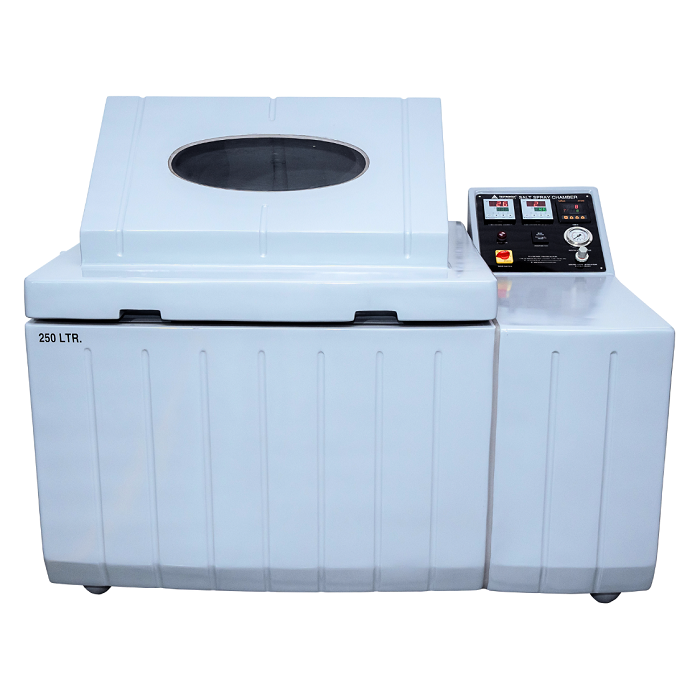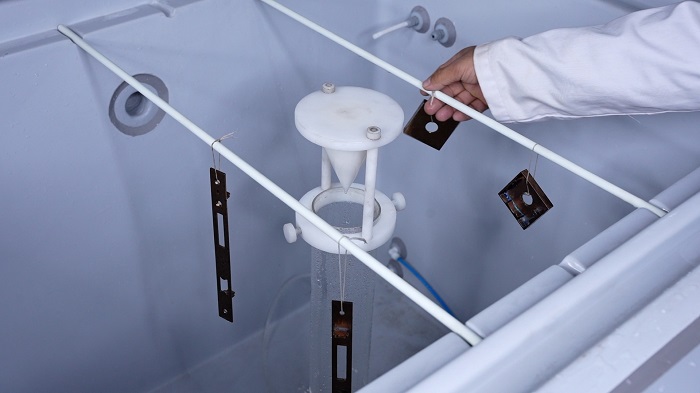Reviewed by Anurag Mishra (Sr. Technical Consultant)

Imagine you are a brand new shiny metal bolt, straight from the factory, all spruced up and ready to take over the world. But wait, the world is not that smooth and dry; it's damp, salty, and full of corrosive elements that are just itching to chip away at you! How do you show off your toughness and robustness to this never-ending enemy of rust? Welcome to the salt spray chamber- your own personal warrior training ground!
In this post, we are going to have a fun yet professional dive into what salt spray chambers are for and some of their main applications. Now that we have some sense of why this equipment is so pivotal for manufacturers, especially in industries making metal components, coatings, and surface finishes, it is time to get corroded… I mean, get started!
In simple terms, a salt spray chamber is like some kind of "weather forecaster" for corrosion. The salt spray test simulates salty harsh environments and sees the life of materials under such conditions. Corrosion is quite a sneaky enemy that eats metals, coatings, as well as any surface slowly over time, without you ever knowing. With this test, however, you will learn how fast or slow this will happen. Hence, the development of better materials, coatings, and products will be put into use to withstand tough environments.
I know, right? Sounds almost like a superpower! In its own, small way, it is! Salt spray testing will predict, sort of, how long your product may survive and endure in general environments such as coastal regions, industrial zones, or even inside your car engine!

Let's get down to brass tacks and into the main reason salt spray testing exists:
1. Corrosion Resistance Assessment
There's no one who would want to see a rusty metal body of their car or outdoor furniture in just a few rainy days, right? There comes salt spray testing. It is useful for manufacturers to test whether their products are resistant to corrosion or can withstand long-term exposure under very harsh conditions. Especially important for daily exposure elements for fasteners, automotive parts, marine equipment, and many others.
2. Quality Control
It is a quality check for manufacturers. It enables the verification of whether their coatings and protective finishes are functional. Who does not want to launch a product into the market only to find it rusting in the customers' hands? That is a PR nightmare!
3. New Product Developments
Salt spray tests are used by manufacturers to fine-tune the manufacturing of any new material or coating, thereby innovating solutions that will last much longer and will perform better in corrosive environments.
Salt Spray Chambers Key Applications Salt Spray Chambers play an important role in several industries. The question might be, "What industry does really need these?" The answer is:
1. Automotive Industry
Auto parts, especially the ones exposed to rain, moisture, or road salt, are tested for salt spray to prevent premature corrosion. Everything, from door handles to brake calipers, has to endure hostile elements for long periods.
2. Marine Industry
Boats, ships, and marine equipment? They live in a saltwater paradise—well, a nightmare! The marine environment is very corrosive, and salt spray testing is crucial to ensure that everything from the ship's hull to the tiniest screws holding it together lasts for long.
3. Construction Materials
Building materials like metals, railings, and even aesthetic components undergo salt spray testing if built in coastal regions, for it's in such regions where salty air seems to breathe down on them. This would ensure that these materials withstand the test of time without succumbing to rust and corrosion.
4. Electronics
Even electronics! Devices exposed to outdoor or industrial environments—like street cameras or outdoor electrical enclosures—should be corrosion-resistant. And a little rust can cause major malfunctions.
5. Packaging
Salt spray testing is particularly relevant in other industries where the packaging will be exposed to harsh environments. Long-term storage in wet and coastal conditions, results in salt spray tests that guarantee that the materials used do not degrade. Examples include metal food packaging or cans.

The duration of this salt spray test varies with the product and testing standard. While some tests might be short, of 24 hours, others can be for 1,000 hours or more. It really does depend on the industry and the level of corrosion resistance under evaluation.
Yes and no. Salt spray testing is an accelerated method to assess corrosion resistance, but it won't reproduce all environmental conditions. However, it's a very common and quick method for comparing the endurance of materials under controlled corrosive conditions.
Almost any material that may be exposed to corrosion can be tested! This includes metals, coatings, paints, and even plastics with specific applications. Salt spray tests are especially common for testing metal products and protective coatings.
Conclusion
That is the lowdown on salt spray chambers! Whether automotive, marine, or construction, salt spray testing will ensure that materials will be strong enough for the corrosive elements they will encounter out in the field. The bottom line is simulating the worst for the best in product durability.
The salt spray chambers by Testronix come in at the top of the range and answer international testing standards. Helps producers and manufacturers ensure that their products are here to stand the test of time. So if corrosion has been bugging you, now you know who to call!